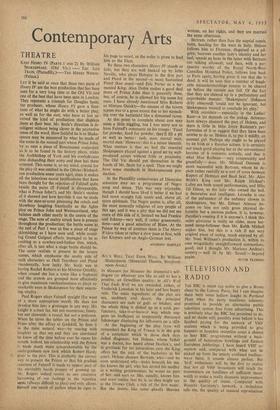IN Measure for Measure the dramatist's self- disgust (or whatever
you like to call it) has a positive, an Orwellian quality; in All's Well That Ends Well we arc reminded, rather, of Frederick Lonsdale in his later and less happy vein. The main ingredients of the plot are sex, snobbery and deceit; the principal characters are cads or gulls or bitches; and the whole thing is dished up in a cold, .per- functory, take-it-or-leave-it way which sug- gests an inefficient or temporarily distracted fishmonger displaying his left-overs on a sl6b
At the beginning of the play (you will remember) the King of France is in the grip of a complaint which ' in those dark days defied diagnosis; but Helena, whose father was a doctor, has heard about Horlick's, and in gratitude for his miraculous cure the King offers her the pick of the bachelors at his court. Helena chooses Bertram, who—and we soon understand why—pales beneath his tan. He knows the girl, who has served his mother as a waiting gentlewoman; he wants no part of her, and says so. She, equally, knows him and must realise that he is. as they might say at the Drones Club, a tick of the first water. But she insists, like some ghastly Shavian woman, on her rights, and they arc married the same afternoon.
Bertram. rather than face the nuptial couch, bolts, heading for the wars in Italy. Helena follows him to Florence, disguised as a pil- grim; borrows another lady's identity and her bed; spends an hour in the latter with Bertram (no talking allowed); and then, with a per- tinacity worthy of the Royal North-West Canadian Mounted Police, follows him back to Paris again, having given it out that she is dead. It will be seen that a number of laugh- able misunderstandings remain to be cleared up before the curtain can fall. Of the fact that they are cleared up in a perfunctory and improbable manner, 'Shakespeare' (Johnson drily observed) 'could not be ignorant, but Shakespeare wanted to conclude his play.'
With outsiders — especially in the Ladies' Race—a lot depends on the jockey. Actresses have always shunned the part of Helena, and there is little in Miss Joyce Redman's per- formance of it to suggest that they have been unwise to do so. Helena is, to put it mildly, an unusual girl. Perhaps she ought to be played by an Irish or a Russian actress. It is certainly not much good playing her as the conventional heroine of a romantic comedy, and that is what Miss Redman — very competently and gracefully — does. Mr. Michael Denison is more successful with Bertram. whom he de- picts rather ruefully as a sort of cross between Rupert of Hentzau and Basil Seal. Mr. Alan Webb's King and Mr. Ralph Michael's Lafeu are both sound performances, and Miss Jill Dixon, as the lady who owned the bed. is decorative and intelligent. Lavache is one of the unfunniest of the unfunny clowns in Shakespeare, but Mr. Edwart Atienza im- poses on him not only gross physical de- formity but a curious pathos. It is, however, Parolles's evening if it is anyone's. I think this miles gloriosus is really an older, more bat- tered camp-follower than Mr. Keith Michell makes him, but this is a rich if not very original piece of acting, much enjoyed by all. Mr. Noel Willman's production is, within its own misguidedly straightforward conventions. good; and 1 thought Mr. Mariano Andreu's
praise.










































 Previous page
Previous page